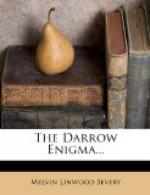“It was while reading ‘The Sign of the Four,’ which I had procured at the Public Library, that I made the first discovery. The crime therein narrated had been committed in such a singular manner that it at once attracted my attention. The victim had apparently been murdered without anyone having either entered or left the room. In this respect it was like the problem we are trying to solve. Might not this book, I said to myself, have suggested to your father’s assassin the course he pursued. I concluded to go to the library and ask for a list of the names of persons who had taken out this book for a few months prior to your father’s death. I was fully aware that the chance of my learning anything in this way was very slight, In the first place; I reasoned that it was not especially likely your father’s murderer had read ‘The Sign of the Four,’ and, in the second place, even if he had, what assurance had I that he had read this particular copy of it? Notwithstanding this, however, I felt impelled to give my synthetical theory a fair experimental trial. I was informed by the Library attendants that the book had been much read, and given the list of some twenty names of persons who had borrowed the book during the time I had specified. With these twenty-odd names before me, I sat down to think what my next step should be. I went carefully over this chain of reasoning link by link. ’I wish to find a certain murderer, and have adopted this method in the hope that it may help me. If I derive any assistance at all from it, it will be because my man has read this particular copy of this work; therefore, I may as well assume at the start that among these twenty-odd names is that of the man I want. Is there any possibility of this crime having been committed by a woman?’ was my next question, and my answer was, ’Yes, a possibility, but it is so decidedly improbable that I may count it out for the time being.’ Accordingly, I set aside all the female names, which cut my list down to eighteen. Several of the applicants had only signed the initials of their given names, and the attendant, copying them from the slips, had done likewise; so I was obliged to go to the registration clerk to determine this question of sex, and, while there, I also ascertained the age of each applicant—that is, of all but two. The registrar could give me no information regarding J. Z. Weltz, or B. W. Rizzi. When I told him that one of the clerks had copied the names for me from application slips, he informed me that if I would go back to her I would undoubtedly find she had taken the two last-mentioned names from the green slips used in applying for books for hall use, as neither J. Z. Weltz nor B. W. Rizzi was a card-holder.




